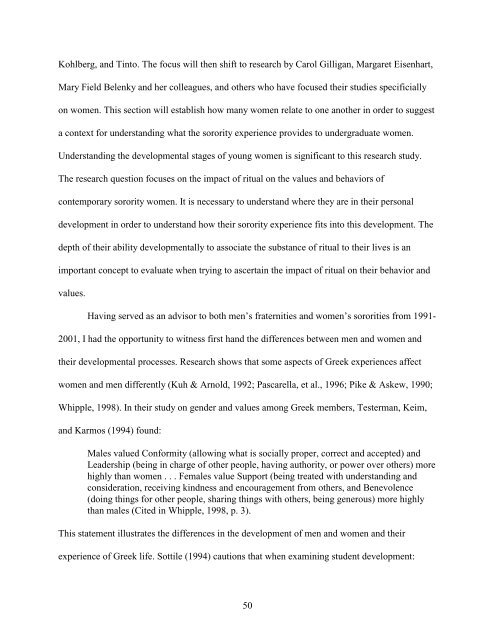Sorority Rituals - Reflections On Rites of ... - Mari Ann Callais
Sorority Rituals - Reflections On Rites of ... - Mari Ann Callais
Sorority Rituals - Reflections On Rites of ... - Mari Ann Callais
You also want an ePaper? Increase the reach of your titles
YUMPU automatically turns print PDFs into web optimized ePapers that Google loves.
Kohlberg, and Tinto. The focus will then shift to research by Carol Gilligan, Margaret Eisenhart,<br />
Mary Field Belenky and her colleagues, and others who have focused their studies specificially<br />
on women. This section will establish how many women relate to one another in order to suggest<br />
a context for understanding what the sorority experience provides to undergraduate women.<br />
Understanding the developmental stages <strong>of</strong> young women is significant to this research study.<br />
The research question focuses on the impact <strong>of</strong> ritual on the values and behaviors <strong>of</strong><br />
contemporary sorority women. It is necessary to understand where they are in their personal<br />
development in order to understand how their sorority experience fits into this development. The<br />
depth <strong>of</strong> their ability developmentally to associate the substance <strong>of</strong> ritual to their lives is an<br />
important concept to evaluate when trying to ascertain the impact <strong>of</strong> ritual on their behavior and<br />
values.<br />
Having served as an advisor to both men’s fraternities and women’s sororities from 1991-<br />
2001, I had the opportunity to witness first hand the differences between men and women and<br />
their developmental processes. Research shows that some aspects <strong>of</strong> Greek experiences affect<br />
women and men differently (Kuh & Arnold, 1992; Pascarella, et al., 1996; Pike & Askew, 1990;<br />
Whipple, 1998). In their study on gender and values among Greek members, Testerman, Keim,<br />
and Karmos (1994) found:<br />
Males valued Conformity (allowing what is socially proper, correct and accepted) and<br />
Leadership (being in charge <strong>of</strong> other people, having authority, or power over others) more<br />
highly than women . . . Females value Support (being treated with understanding and<br />
consideration, receiving kindness and encouragement from others, and Benevolence<br />
(doing things for other people, sharing things with others, being generous) more highly<br />
than males (Cited in Whipple, 1998, p. 3).<br />
This statement illustrates the differences in the development <strong>of</strong> men and women and their<br />
experience <strong>of</strong> Greek life. Sottile (1994) cautions that when examining student development:<br />
50



